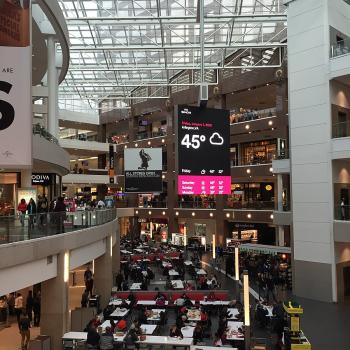Hey it’s my birthday, let’s have some fun! This is a very, very scattershot link round-up. Mostly snagged from people I follow on Twitter and you should too.
Walter Olson, “Petty Offenses and Police-Community Relations in Ferguson”:
It seems so random and meaningless that a legal offense as minor as walking on the roadway would set in motion what was to prove the fatal confrontation between officer Darren Wilson and Michael Brown. But in the wider scheme of how Ferguson came to have its problem with policing, it may be neither random nor meaningless.
more (and see also this New Yorker piece, despite my intense caveats about the way it frames “understaffing” and “underfunding” as the problem–adding staff and funds would increase the already-shocking perverse incentives at work–the problem is overpolicing and overcriminalization.)
Alex Tabarrok on “Ferguson and the Modern Debtor’s Prison”:
…You don’t get $321 in fines and fees and 3 warrants per household from an about-average crime rate. You get numbers like this from bullshit arrests for jaywalking and constant “low level harassment involving traffic stops, court appearances, high fines, and the threat of jail for failure to pay.”
If you have money, for example, you can easily get a speeding ticket converted to a non-moving violation. But if you don’t have money it’s often the start of a downward spiral that is hard to pull out of …Of course, if you are arrested and jailed you will probably lose your job and perhaps also your apartment–all because of a speeding ticket.
As a final outrage, consider this story which ties together Ferguson, the courts, and the arrest of parents, often minority parents, for leaving their kids to play in parks (just as my parents did).
You don’t get $321 in fines and fees and 3 warrants per household from an about-average crime rate. You get numbers like this from bullshit arrests for jaywalking and constant “low level harassment involving traffic stops, court appearances, high fines, and the threat of jail for failure to pay.”
If you have money, for example, you can easily get a speeding ticket converted to a non-moving violation. But if you don’t have money it’s often the start of a downward spiral that is hard to pull out of
– See more at: http://marginalrevolution.com/marginalrevolution/2014/08/ferguson-and-the-debtors-prison.html#sthash.lQPYdjLk.dpuf
You don’t get $321 in fines and fees and 3 warrants per household from an about-average crime rate. You get numbers like this from bullshit arrests for jaywalking and constant “low level harassment involving traffic stops, court appearances, high fines, and the threat of jail for failure to pay.”
If you have money, for example, you can easily get a speeding ticket converted to a non-moving violation. But if you don’t have money it’s often the start of a downward spiral that is hard to pull out of
– See more at: http://marginalrevolution.com/marginalrevolution/2014/08/ferguson-and-the-debtors-prison.html#sthash.lQPYdjLk.dpuf
And some thoughts on the future: The indispensable Radley Balko on 8/14, “After Ferguson, how should police respond to protests?”
The events these last few days in Ferguson, Missouri ought to be of grave concern to anyone who believes in the First Amendment, and specifically the rights to free speech, protest, and assembly. As you may have read, last night was particularly ugly, as police arrested a St. Louis alderman, Huffington Post reporter Ryan J. Reilly, and our own Washington Post reporter Wesley Lowery. Police also tear-gassed a news crew from Al-Jazeera. There are also reports, video, and images of police teargassing, arresting, and otherwise intimidating peaceful protests all over the town. …
The Occupy protests were also a fascinating case study in protest and how governments should respond to them. Because the protests went on all over the country, and because the police responses were so varied from city to city, we can look at the different approaches, the results those approaches produced, and perhaps gain some insight into how to best protect safety and property without infringing on the civil rights and liberties of protesters.
Maj. Max Geron is in charge of the Media Relations Unit, Community Affairs and Planning Unit of the Dallas Police Department. He’s also a security studies scholar who recently wrote his master’s thesis on policing and protests at the Naval Postgraduate School. Specifically, his thesis studied police reactions to the Occupy protests in Oakland, New York, Portland, and Dallas. “The ideal police response to a protest is no response at all,” Geron says. (Geron emphasized that he was speaking as a scholar, and his views don’t necessarily represent those of the Dallas Police Department.) “You want to let people exercise their constitutional rights without interference.”
Barring that, Geron says, it’s important for police to communicate with protesters to establish expectations. “The technical term is negotiated management. What that means is that you want to come to an agreement about what’s expected, what’s allowed, and most important, you want to reach an agreement about what won’t be allowed.”
But Geron cautions against setting arbitrary expectations, such as mandatory dispersal times. “Most protesters will meet, protest, and go home when they feel they’ve made their point. If they aren’t breaking any laws, they can be left to express themselves.” Establishing a dispersal time then gives protesters something to rebel against. “When you establish arbitrary rules that have no basis in law, the police then feel they have to enforce those rules or they look illegitimate. They can set these rules with the best of intentions, but they just end up creating more problems for themselves.”
Geron also stresses fluidity and the ability to adjust on the fly. Police organizations are fond of protocol and standard operating procedures. But protests can be unpredictable. “The standard or by the book response may not be the best response,” he says. He points specifically to the Ferguson Police Department not releasing the name of the police officer who shot Michael Brown. “That may be the policy there. But you have to look at the situation. You have a community that is upset, that feels wronged. It’s important to establish trust with them. A big part of that is helping them to believe that you’re being straight and transparent with them. You have to be sure to protect the officer’s safety, but to win trust you have to be aware of the people’s fears, and you need to show you’re willing to make concessions to accommodate those fears.”
One active police chief who has adopted a less reactionary approach was Chris Burbank in Salt Lake City. I profiled Burbank last fall for the Huffington Post. Here’s what happened when the Salt Lake city council told Burbank he’d have to remove the Occupy protesters from the park where they had been encamped. …
One final, important point: Policing is often cast as a balance between safety and freedom. The problem with that formulation is that it implies that to get a little more of one, we have to give up a some of the other. You need only look at Ferguson to see why that isn’t true. I doubt the residents of that town feel particularly safe or particularly free right now. The corollary to this is that there’s also a zero-sum relationship between officer safety and less aggressive, less militaristic more community-oriented policing. You have to give up some of one in order to get more of the other. Again, Ferguson is a pretty compelling argument to the contrary. The town is essentially a martially law zone right now. And I’d be surprised if you could find many officers on duty these last few nights who would tell you they feel safer today than they did a few weeks ago.
more–really important, and has both mask-of-command angles and a DC history angle which I’d never heard about before.
And more from Balko last year, “How to Roll Back Police Militarization in America.” You will not be surprised at item #1, “End the Drug War”; but you may not be aware of the raft of perverse incentives, from asset-forfeiture to extra money if police departments ramp up drug raids, which drive militarization. There are major obstacles to all of these reforms, of course:
In 2008, the Maryland legislature passed a bill requiring all police agencies in the state to issue twice-yearly reports on how often they use their SWAT teams, for what purpose, what the searches found, and whether any shots were fired. It’s a simple bill that puts no restrictions on the use of SWAT teams, yet was opposed by every police agency in the state.
(I’m guessing “police agency” means unions? Obviously individual officers often support demilitarization, as Balko’s interviews show.)
Walter Olson, “Let’s Demilitarize the Regulatory Agencies, Too”:
…As McMorris-Santoro notes in the BuzzFeed piece, Rep. Chris Stewart (R-Utah) has introduced a bill called the Regulatory Agency Demilitarization Act, citing such unsettling developments as a U.S. Department of Agriculture solicitation for submachine guns. 28 House Republicans have joined as sponsors, according to Ryan Lovelace at National Review.
more –SWAT teams for suspected FAFSA fraud and raw milk sound like great ideas, definitely. I look forward to the day when our schools have all the money they need, and the Department of Education needs to hold a bake sale to fund a SWAT team.
Jonathan Coppage, “Will the Panopticon Save Us from the Police?”
…That relationship-building is a core component of a police officer’s mission, and may be almost entirely divorced from the work he can get done on his car’s mounted notebook computer. It also requires a certain amount of discretion, getting to know a neighborhood’s warts as well as its virtues. The conversations that give an officer an accurate picture of the seedy but not destructive side of his citizens’ lives could very well be more difficult or awkward should the policeman’s sunglasses be rolling film.
more (and for more on body cameras, see Balko [“Prince George’s County officials say all seven dashboard cameras in the police cruisers coincidentally malfunctioned. …[I]f it’s the police officer’s word against his antagonist’s, there should be video to validate one side or the other, and that video mysteriously goes missing while in police custody, the police should have to pay a penalty in court.”] and Turley [“the troubling appearance of an officer with a prior run in with a suspect who turns off her camera minutes before shooting the suspect in the head“])
Meanwhile “These Georgia Teens Created a Yelp to Rate the Police”:
…Here’s how Five-O works: Users log in to a dashboard, where they have several options. A Five-O user can create a detailed incident report and rate the professionalism and courtesy of the officer, using an A-F scale. Or they can view police stations by county or state to see how various departments rate. (Those A-F officer interaction scores are averaged out on a 4.0 scale—like a GPA for the fuzz.)
The app also allows people to post messages to a community board. There’s another function called “Know Your Rights,” a Q&A-formatted feature, “so you have your rights at your fingertips at any moment,” Christian says. The family drew the information from the American Civil Liberties Union.
Christian, a senior at Parkview High School, credits her brother Caleb for the idea to create an app for rating police interactions. They decided early on in the project planning stages that Five-O would focus on the good as well as the bad.
“I haven’t really heard of issues happening in Stone Mountain of the scale of what’s in the news,” she says. “I do have relatives who have had negative interactions with police.” She says that friends of the family include police officers, who offer a friendlier model for police interactions. “This is an app to offer up positive experiences. They can be an example.”
more (you can already find Yelp reviews for jails btw)
And regardless of the policy questions, I’d strongly encourage all of you to consider donating to the besieged community of Ferguson. I just sent money. Here is Fight for Ferguson (“The money will be used for bail for protestors, food and water, if needed and protective supplies against police attacks. We also anticipate moving to the next phase of this movement with strategies that we have not yet implemented.”) and/or you can PayPal this address to help with needs like feeding protesters, getting school supplies, et cetera.











